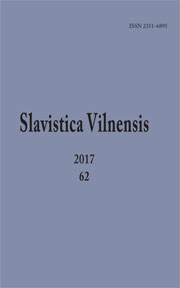Imiesłowy funkcjonujace w rosyjskiej gwarze staroobrzedowców mieszkajacych na Suwalszczyznie
Participle Functioning in the Russian Dialect of the Old Believers who live in the Suwałki Region
Author(s): Dorota Paśko-KonieczniakSubject(s): Regional Geography, Phonetics / Phonology, Lexis, Comparative Linguistics, Eastern Slavic Languages, Philology
Published by: Vilniaus Universiteto Leidykla
Keywords: Old Believers; adjectival participles; adverbial participles; bilingualism; loanwords; Russian dialect;
Summary/Abstract: The Russian dialect of the Old Believers who live in Poland is an example of an isolated dialect. The state of vocabulary in the dialect depends on many linguistic and extralinguistic factors. Linguistic and lexical changes are predominantly influenced by developments in terms of history, civilization, culture and administration. The studied dialect is described as the most related to the western group of Central Russian akanie dialects, the so-called Pskov group. The influence of the Polish language on the dialect is most noticeable in the sphere of vocabulary. Similar to other Russian dialects, in the dialect used by the Old Believers, there mainly exist past passive and past adverbial participles (forms with -fšy endings). In the Old Believers’ dialect, participial forms function as predicates. However, adverbial past participles are not used as predicates in the standard variety of the Russian language. Forms with -(f)šy endings are predicates in northwestern Russian dialects (e.g., in the Pskov and Novgorod dialects) and in the Belarusian dialects spoken in the Belarusian-Lithuanian borderland as well as in the dialects used in Suwałki and Podlachia, near Sejny, and in the Northern-Borderland Polish language.
Journal: Slavistica Vilnensis
- Issue Year: 62/2017
- Issue No: -
- Page Range: 173-188
- Page Count: 16
- Language: Polish

